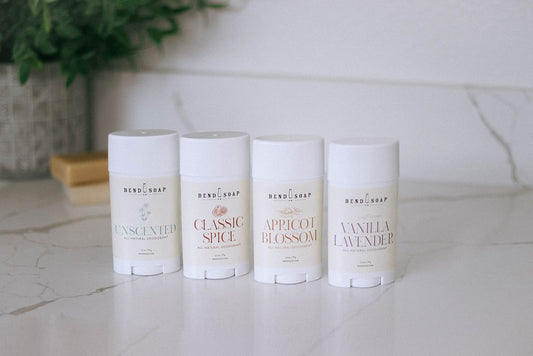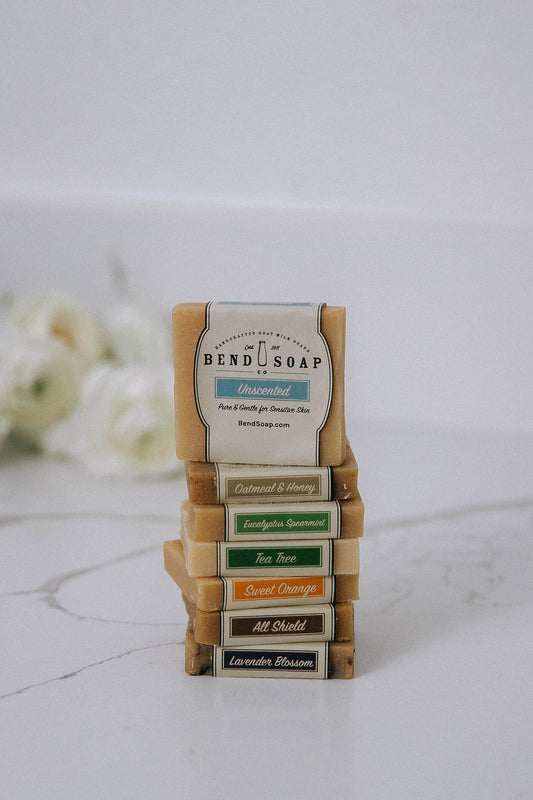In the same way that the food items found on grocery store shelves include preservatives to keep them shelf-stable, lotions, soaps, shampoos, and a variety of other personal care items contain them as well. These chemicals, called parabens, do serve a purpose, as they can prevent the growth of bacteria, fungi, and yeast that can cause products to spoil. Unfortunately, they also bring a host of negative consequences.
The History of Parabens
Regarding personal care products, soap was the first to earn mainstream popularity. An Englishman named Andrew Pears created the first mass-market translucent soap in 1807, and in 1927, his company, A&F Pears, was acquired by the British Lever Brothers.
William and James Lever entered the soap-making business in 1885. By 1888 they were producing 400 tons of soap per week in Europe. The brothers then came to the U.S. in 1895 and by 1929 were the third-largest soap producers in the country.
The need for soap was understandable, as hygiene concerns related to disease took hold, but the widespread use of other personal care products was slow to occur.
For example, liquid shampoo wasn’t invented until 1927. Before that, people relied on natural ingredients and ancient techniques for cleansing their hair. Makeup became popular in the 1920s and 30s, inspired largely by the burgeoning Hollywood film industry and the fact that many still-active cosmetic companies (including Revlon, Maybelline, and Loreal) were founded during the first three decades of the 20th century.
By the 1950s, as products like face moisturizers, hair conditioners, and lipsticks became popular, companies were tasked with creating safe, effective products that they could manufacture at a rapid — and cheaper — rate. This lead to the introduction of parabens, which could keep products from spoiling while being distributed to retailers across the country.
Parabens are derived from para-hydroxybenzoic acid, which occurs naturally in plants, but modern cosmetic products contain a chemically manufactured form that is far more dangerous than its natural version.
Why are Parabens Bad?
Because commercial paraben use is still a relatively new phenomenon, the Centers for Disease Control and Prevention (CDC) notes that “human health effects from environmental exposure to low levels of parabens are unknown.”
What’s more, color additives (that is, the ingredients that make a lipstick red or some bars of soap that bright green color) are the only cosmetic ingredients that are subject to approval from the Food and Drug Administration (FDA). Granted, cosmetic companies are forbidden from selling any product that is deemed unsafe, but this determination must come from “reliable scientific information.”
The FDA says that its scientists are continuing to review published studies that examine paraben safety, but as of now, the organization claims to have no “information showing that parabens, as they are used in cosmetics, have an effect on human health.”
This position stands in stark contrast to a 2004 study that found traces of parabens in the breast tissue of women. While the study didn’t link the existence of the parabens to an increased incidence of breast cancer, the Campaign for Safe Cosmetics notes that the study is still important “because it detected the presence of intact parabens—unaltered by the body’s metabolism—which is an indication of the chemical’s ability to penetrate skin and remain in breast tissue.”
“As a result,” the organization adds, “repeated application of a product or multiple products containing parabens could mean almost continuous exposure.”
The Environmental Working Group, meanwhile, notes that parabens can disrupt hormone function and production and also cause skin irritation.
How to Avoid Parabens
In the early 2000s, when it was first determined that parabens may be potentially harmful, finding paraben-free products was extremely difficult. Aside from the fact that online shopping was still far from a reality, and shoppers only had access to the products sold at local retailers, there just weren’t many companies investing in the production of all-natural products.
But my, how things have changed! Today, there are numerous brands that have committed to manufacturing all-natural, paraben-free products — including Bend Soap Company!
Reading ingredient labels is one way to determine whether a company uses parabens in their products. According to the FDA, the parabens most commonly used in cosmetics are methylparaben, propylparaben, butylparaben, and ethylparaben, but understanding cosmetic ingredients labels can be extremely difficult without a science degree. We encourage you to do your research and educate yourself on the ingredients that are being used to make the products you and your family rely on. Get a jumpstart on identifying ingredients to steer clear from and avoid in this blog post.
Many companies are declaring their paraben-free status in bold letters on their labels, making it easy for consumers to gauge their commitment to healthy cosmetics. This is one way to shop for personal care products, but at Bend Soap Company, we take an entirely different approach: we make our products with simple, all-natural ingredients that even kids can read and understand!
Our Unscented Goat Milk Soap, for example, contains only four ingredients: fresh goat milk, saponified coconut oil, olive oil, and sustainably sourced red palm oil. That’s it! Simple, hypoallergenic, and (obviously) free of parabens and other icky ingredients you’re likely to find in many mainstream products.
Back to You
If your someone who’s committed to a healthy lifestyle, watching what you eat and exercising regularly, avoiding harmful ingredients in your personal care products is the logical next step. Parabens are known to impact hormones and the skin, and while they are found in a large number of conventional products, there is an increasing number of paraben-free products that you can feel safe using on your whole body and the entire family.
Continue Reading
- Blog Post: The Hidden Dangers of Bath Bombs You Need to Know
- Blog Post: This Is How Your Orders at Bend Soap Company Are Changing Lives
- Blog Post: Your Exfoliating Face Wash is Doing More Harm Than Good
- Blog Post: Must-Have Skincare Products for Newborns





2 comments
This message was so inspiring! I suffer psoriasis and I have heard these products work like a charm. Although, I haven’t tried it myself yet I will most certainly see. It is super important for us as mothers to take care of ourselves first in order to care for our babies properly. Thank you Bend Soap for giving us that hope!
emNAUaghwO